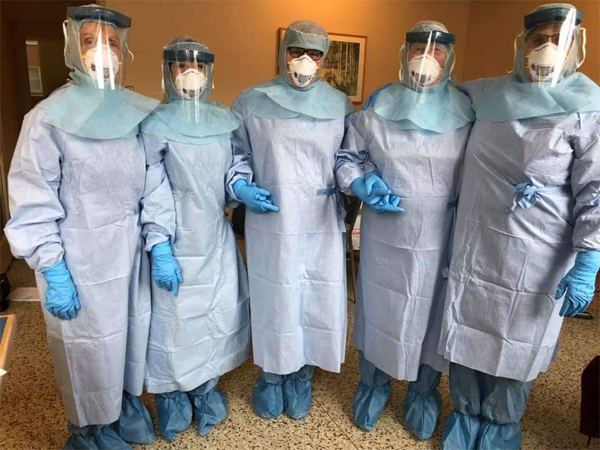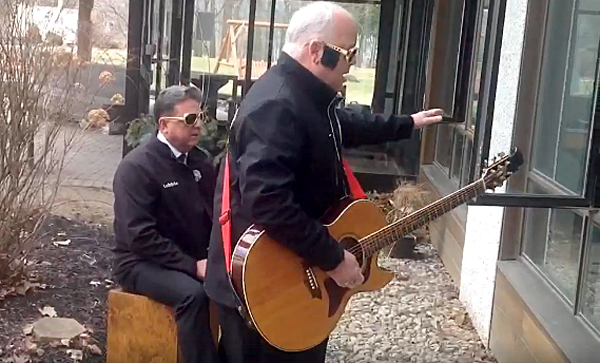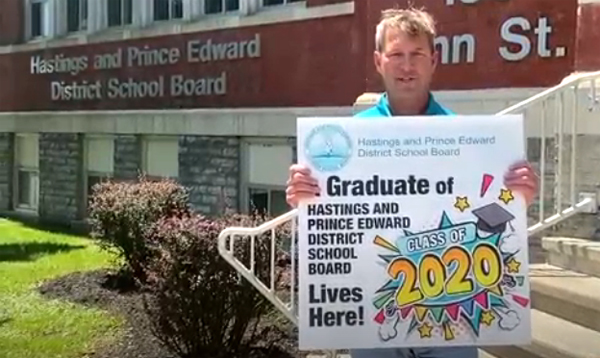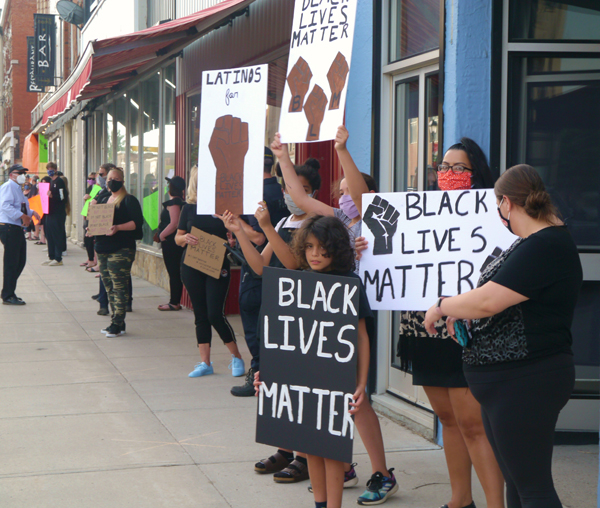Coping with COVID-19 in Prince Edward County – a year in review
Administrator | Mar 13, 2021 | Comments 1
The COVID-19 pandemic changed everything in 2020. It altered the way people communicate, work, learn, shop, and socialize – but it didn’t change how County residents come together in times of need. Here’s a look back through some of the highlights of the first year of living with coronavirus in Prince Edward County:
The first case in the region was recorded March 11, the same day the World Health Organization declared a world-wide pandemic, but Hastings Prince Edward Public Health (HPEPH) had already been working on its campaign to stop the spread and was encouraging residents to prepare.
“While the current risk to Canadians remains low, this could change very rapidly” said Dr. Piotr Oglaza, Medical Officer of Health and CEO at HPEPH on March 3. “There is a strong possibility that this virus could emerge locally.”
Canadian Forces Base 8 Wing Trenton, in January and February, had already been involved with the repatriation and quarantine of almost 700 Canadians abroad and some 200 people from a Diamond Princess cruise ship in California. The HPEPH’s first case was an individual at CFB Trenton who arrived March 9 aboard the flight of Canadians repatriated from the ship.
The County’s preparations were also under way with the municipality calling together its Emergency Management Control Group, setting up screening at McFarland Memorial, its long-term care facility, and enhancing cleaning in all the County’s buildings and facilities.
The Hastings Prince Edward School Board cancelled all international school trips and soon after, the province announced it would close all publicly-funded schools in Ontario. Entertainment venues and sports organizations were also cancelling events. That afternoon saw record crowds stocking up in local stores.

 While Canada’s health minister had encouraged people to stockpile medicines and some supplies in case of an outbreak, toilet paper aisles everywhere were wiped clean, as were supplies of sanitizers, cleaning products and non-perishable foods.
While Canada’s health minister had encouraged people to stockpile medicines and some supplies in case of an outbreak, toilet paper aisles everywhere were wiped clean, as were supplies of sanitizers, cleaning products and non-perishable foods.
By March 16, local public health estimated there were more than 35 ‘probable’ COVID-19 cases in the region. As of March 20 last year there were 925 cases across the nation, and 12 deaths. One year later, there have been more than 900,000 cases and 22,000 deaths in Canada.
Over the next few weeks, County businesses were radically changing the way they delivered services, or were closing. Only essential businesses could remain open – such as gas stations, stores that sold groceries, and hardware stores. The workers at these locations were also called heroes, along with health and emergency personnel.
The phrases ‘wash your hands’, ‘flatten the curve’ ‘social distancing’ and ‘family bubble’ became part of every day conversation. Challenges included constant sanitizing of surfaces, finding and remembering to wear masks.
With playgrounds closed, puzzles and games were dusted off and families were making big adjustments trying to work, learn and stay at home. Some were learning to cook and bake bread. Fewer cars were on the road and a full tank of gas was lasting some people a month or more.

Donations of unused and unopened personal protection equipment – including goggles, face shields, gloves, gowns and masks (particularly N95 masks) were welcomed by QHC staff and physicians in Picton. The call for donations went out to industrial facilities, mechanical shops, paving companies, veterinarians and construction companies who may have extra. Expired items were used for mask-fit testing of staff and physicians.
It wasn’t long before County residents began to rally. Volunteers were mustering to deliver food, essentials and to sew masks. They were also finding ways to bring joy.
 Among hardest hit were residents and families of long-term care homes. Rob Manlow and Peter Rea, of ‘The Reasons’ performed music for quarantined residents at H.J. McFarland Nursing Home outside three common areas while residents gathered for lunch. The band members regularly bring cheer to the local homes but this performance was different, said Rea. “They’re inside and can’t have visitors, so it really felt special this time… It’s the County way. It’s time for everybody to pull together.”
Among hardest hit were residents and families of long-term care homes. Rob Manlow and Peter Rea, of ‘The Reasons’ performed music for quarantined residents at H.J. McFarland Nursing Home outside three common areas while residents gathered for lunch. The band members regularly bring cheer to the local homes but this performance was different, said Rea. “They’re inside and can’t have visitors, so it really felt special this time… It’s the County way. It’s time for everybody to pull together.”
In a community changed by the effects of the COVID-19 virus, one thing that remained constant was County residents’ drive to cope as best they can and help each other in the process.

“In the midst of everything that is going on around us, it makes my heart melt for those in the community that are still thinking of others during this difficult time,” said Linda Downey of the many contributions to the Storehouse Foodbank in Wellington.
Ellen Brownbill, of the Picton United Church Food Bank, was also grateful for the increase in donations and dedication of volunteers as they face a higher need.
The volunteers are cognizant of social distancing but they’re not staying home, Brownbill said, “because if we stay home, people go without.”
Self-assessment tools appeared online to help people determine whether to seek care, self-isolate or monitor for symptoms. Governments at all levels were announcing support measures to help struggling citizens and businesses.

Residents began displaying ‘Thank You’ messages for healthcare and emergency workers in their windows and on lawns and delivered coffee, meals and baked goods for staff at the hospital, nursing homes, the police and fire stations.
By March 31, HPEPH had eight confirmed cases and recorded its first death related to the coronavirus. As local cases jumped just days later to 17, COVID-19 assessment centres were opening – including in Picton, by appointment.
The provincial government announced revisions to essential workplaces, restricting access to short-term accommodations, seasonal trailer parks and recreational campgrounds.
The Prince Edward County Memorial Hospital Foundation launched its COVID-19 Relief Fund, noting the financial impact on the local healthcare system during the pandemic is unknown, but would be significant.

Pictured in front of the Emergency Department at PECMH on April 27 is Shannon Coull, executive director of the PECMH Foundation, with Cody-Rae Fowler, a Picton teen who put her sewing skills and unexpected free time to use by making about 1,750 face masks for people who needed them and presented PECMHF with $3,210 in proceeds.
By the end of April, local Public Health recorded its third death related to the pandemic, and had 39 lab-confirmed cases.
With closures extended and limits to public gatherings, more cancellations of much-loved events in the County followed, including Canada Day festivities.

While closed, the Prince Edward County Public Libraries raised the virtual bar bringing extensive online programming to children, adults and families. Above, Joanna Howard, children and youth programs co-ordinator conducting a science experiment with her assistant ‘black cat’.
The fifth COVID-19 related death was reported by HPEPH on May 7.
Forced to work from home and conduct meetings online, County residents were – and continue to – feel the impact of spotty and poor internet service across the County.
Well known County musician, Fraser Hardman, and his wife Robyn co-wrote ‘Crazy Covid World’ a song about the coronavirus that raised more than $2,000 for the Prince Edward County Memorial Hospital Foundation. A clip of the song below:
Outstanding athletes at Prince Edward Collegiate Institute were honoured virtually due to the pandemic and rules limiting gatherings. With almost an entire semester cancelled, athletes were unable to compete in several sports. On a lighter note, before closures, the 2019-2020 year included a second COSSA championship and OFSAA appearance in a row for the Senior Boys Basketball team.
 The community continued cheering staff at Prince Edward County Memorial Hospital with donations of snacks and important safety supplies. Canadian Tire staff, above, donated five 20-litre containers of hand sanitizer.
The community continued cheering staff at Prince Edward County Memorial Hospital with donations of snacks and important safety supplies. Canadian Tire staff, above, donated five 20-litre containers of hand sanitizer.

Lawns got a pop of congratulatory colour as 1,200 signs like the one shown above with Director of Education Sean Monteith, celebrated Grade 12 graduates – the Class of 2020. They were distributed by the Hastings Prince Edward District School Board as students were unable to celebrate at graduation ceremonies. Public school graduates were honoured with a special County Radio on-air presentation.
 In June, County residents also continued to bring light to concerns as they masked up and social distanced for a Black Lives Matter anti-racism demonstration that saw hundreds of participants line Main Street, Picton.
In June, County residents also continued to bring light to concerns as they masked up and social distanced for a Black Lives Matter anti-racism demonstration that saw hundreds of participants line Main Street, Picton.
 An unprecedented tide of tourist traffic to the County congested roads all summer – especially to the Sandbanks Provincial Park. Seven signs were posted on the east-and-westbound Hwy 401 alerting visitors to the status of closure of the beach. The Prince Edward Family Health Team urged seasonal visitors to stay home to help preserve the County’s limited resources. The beaches regularly closed well before noon.
An unprecedented tide of tourist traffic to the County congested roads all summer – especially to the Sandbanks Provincial Park. Seven signs were posted on the east-and-westbound Hwy 401 alerting visitors to the status of closure of the beach. The Prince Edward Family Health Team urged seasonal visitors to stay home to help preserve the County’s limited resources. The beaches regularly closed well before noon.
Little Bluff Conservation Area was closed at the end of July due to reports of overcrowding on the beach where individuals were not able to meet the two metre physical distancing requirements, and non-permitted activities such as garbage dumping, campfires, and overnight camping. This led the Conservation Authority to revoke access. The County also set higher fines to address crowded weekend parking near water access points and had to staff Wellington beach and boat launches to help with crowd and traffic control.
Following a lull in COVID-19 cases since May 18, the HPEPH recorded its first lab-confirmed case July 30. The next new case came Aug. 15. In September, with more cases being reported province-wide, new restrictions saw 10 people allowed at an indoor event (from 50) and 25 at an outdoor event (from 100). By September’s end, Hastings Prince Edward Public Health reported one case active in the two counties – the first since Sept. 5.
Prince Edward County Mayor Steve Ferguson said County residents had been fortunate with a low case count over the pandemic, but said the first new case in almost three weeks was a reminder. “We can’t let our guard down in any way, shape or form. We must be prepared for anything that COVID-19 throws at us in the coming weeks and months… to ensure the virus doesn’t spread within our community, to our schools and long-term care homes, and as a result, overwhelm our hospital capacity.”
Aspects of the socio-economic impact of the first six months of the pandemic were reported to council by Brian Beiles, president of The County Foundation.
“Organizations and volunteer groups have demonstrated flexibility, resilience, and commitment to maintain services through the first six months of COVID-19,” he said. “But the research also points to community challenges to be addressed, some of which were exacerbated by the pandemic.”
In one of several quotes in the report, Susan Quaiff, Executive Director of the HUB Child and Family Centre, summed up the past six months: “The greatest challenge was the feeling of loss, not being in control, and trying to support everyone as much as possible,” she said. “We have been resilient, but everyone has some scars and stress.”
In discussing mental health, the report highlights the combination of social isolation, high stress, job losses, grief, closures of regular services and supports, access to cannabis and alcohol, and an overwhelmed health care system creating an environment for mental health and substance abuse problems.
Quinte Health Care emergency departments had reached an all-time high of opioid overdoses in April and May. The region was already experiencing an opioid crisis before the pandemic.
Long-term care and group home residents (and families) are also experiencing emotional distress and mental health concerns due to the combination of social isolation and restricted activities.
The pandemic put additional pressure on people who lost income or employment. With the new normal of working remotely using virtual technology, people began relocating to Prince Edward County in record numbers which increased housing prices and reduced availability in a market already bereft of attainable housing due to the ballooning number of short-term accommodations and higher than average rent.
Prince Edward County’s real estate market was record-setting red-hot though inventory of homes was at the lowest in decades. “Despite COVID-19, or maybe because of it, the supercharged real estate market which began in the summer, continued right through December,” said Treat Hull, of Treat Hull & Associates Brokerage. “In a normal year, real estate in the County slows to a crawl as the holidays approach, but this year’s December sales were almost double what they were last year.” The average price of 44 sales in December was $864,995 compared to 23 sales in 2019 with an average price of $456,172.

Community volunteers adapted to create a drive-through fall fair at Picton and two evenings of Halloween drive-through fun at Loch Sloy.
By November’s end, Hastings Prince Edward moved up to the ‘yellow/protect’ zone from the ‘green/prevent’ zone as there were 27 new cases over a seven day period, including an outbreak of nine cases in a Belleville workplace. The County was making preparations to take further action if it were to be moved to the orange/restrict zone in the provincial government’s response framework. It was not moved to the orange zone.
On Dec. 3 two cases were related to local schools and by Dec. 10 there were 47 active cases – some connected to workplace outbreaks in Belleville and Trenton, and Wellington.

With all Santa Claus parades cancelled, thousands still enjoyed a festive drive through ‘reverse’ parade at Loch Sloy that ended with a ‘visit’ from Santa and his elves.
The province began its second pandemic state-of-emergency lockdown on Dec. 26, asking residents to again, stay at home. The order was lifted in February and Hastings Prince Edward re-opened in the ‘green/prevent’ zone.
 In February 2021, COVID-19 vaccines were beginning to roll out in the region with Hastings Prince Edward Public Health implementing stage one, priority vaccinations, followed by age-based groups.
In February 2021, COVID-19 vaccines were beginning to roll out in the region with Hastings Prince Edward Public Health implementing stage one, priority vaccinations, followed by age-based groups.
As of March 11, there were 12 active cases – five of which are variants of concern. There were 433 total cases over the past year of the pandemic, 415 recoveries and six deaths. HPEPH reported 10,679 vaccines have been administered.
The coronavirus variants are still a concern. Experts are advising people to continue being vigilant to avoid a third wave in April.
A vaccine clinic has been set up at the Prince Edward Community Centre in Picton, as well as other areas throughout the region. HPEPH plans to begin to offer the vaccine to individuals 80 years of age and older beginning mid-March, then follow with the next phases over the next few months. Some people in the 60-64 age group are also now signing up for vaccines at Kingston and area pharmacies.
“For the past year we have rallied as a community to prevent the spread of the virus,” said Mayor Steve Ferguson. “The arrival of the vaccine gives us hope that better days are ahead, and we will do everything we can as a municipality to ensure vaccination is a success.”
Filed Under: Featured Articles • Local News
About the Author:



































What an interesting summary of a truly strange year. I think you described the challenges we encountered and the resulting rally of community spirit very well. Thanks for taking the time to offer this retrospect as we move into this next year, hopefully with lessons learned and a continuation of caring for one another.